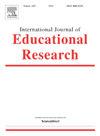Chaotic (laissez-faire) teaching: The most harmful style for students’ psychological needs?
IF 2.5
3区 教育学
Q1 EDUCATION & EDUCATIONAL RESEARCH
引用次数: 0
Abstract
Self-Determination Theory (SDT) has been widely used to understand how different teaching styles impact student outcomes. Previous research has mainly focused on the negative effects of controlling teaching, while the influence of chaotic (laissez-faire) teaching has been less explored. This study examines how students' perceptions of highly chaotic (i.e., abandoning) and highly controlling (i.e., domineering) teaching approaches are related to the satisfaction and frustration of student basic psychological needs in secondary physical education (PE). The study involved 916 students in Belgium (58% girls; 15.37 ± 1.62 years old) and 1124 students in Spain (52% girls; 14.60 ± 1.51 years old).
Using linear mixed-effects models, we found that both abandoning and domineering teaching approaches were adversely associated with students' basic psychological needs. The abandoning approach showed the strongest positive association with overall need frustration in both samples. Moreover, the abandoning approach was most strongly associated with competence and relatedness frustration in both countries, as well as with lower competence satisfaction in Spain. Both approaches showed a similar positive relationship with autonomy frustration.
This study expands our understanding of demotivating teaching by demonstrating the harmful potential of highly chaotic teaching, beyond the well-known harmful effects of controlling teaching. The consistency of the findings across both countries highlights the international relevance of this research. These findings suggests that reducing highly chaotic (i.e., laissez-faire) teaching should be a priority in international educational practices and policies. Future research could investigate the causes, effects, and potential moderators of chaotic teaching to further guide educational policy and practice in different cultural contexts.
混乱(放任)教学:对学生心理需求最有害的教学方式?
自我决定理论(SDT)被广泛用于理解不同的教学风格对学生成绩的影响。以往的研究主要集中在控制性教学的负面影响上,而对混沌(自由放任)教学的影响的探讨较少。本研究旨在探讨中学体育教学中,学生对高度混乱(即放弃)和高度控制(即霸道)教学方式的认知与学生基本心理需求的满足和挫败之间的关系。这项研究涉及比利时的916名学生(58%是女孩;15.37±1.62岁),西班牙学生1124人(女生52%;(14.60±1.51岁)。采用线性混合效应模型,我们发现抛弃式和霸道式教学方式与学生的基本心理需求呈负相关。在两个样本中,放弃方法与总体需求挫折表现出最强的正相关。此外,在这两个国家,放弃方法与能力和关系挫折最密切相关,在西班牙,放弃方法与较低的能力满意度相关。两种方法都显示出与自主性挫折相似的正相关关系。除了众所周知的控制教学的有害影响外,本研究还展示了高度混乱教学的有害潜力,从而扩展了我们对去激励教学的理解。两国研究结果的一致性突出了这项研究的国际相关性。这些发现表明,减少高度混乱(即自由放任)的教学应成为国际教育实践和政策的优先事项。未来的研究可以探讨混乱教学的原因、影响和潜在的调节因素,以进一步指导不同文化背景下的教育政策和实践。
本文章由计算机程序翻译,如有差异,请以英文原文为准。
求助全文
约1分钟内获得全文
求助全文
来源期刊

International Journal of Educational Research
EDUCATION & EDUCATIONAL RESEARCH-
CiteScore
6.20
自引率
3.10%
发文量
141
审稿时长
21 days
期刊介绍:
The International Journal of Educational Research publishes regular papers and special issues on specific topics of interest to international audiences of educational researchers. Examples of recent Special Issues published in the journal illustrate the breadth of topics that have be included in the journal: Students Perspectives on Learning Environments, Social, Motivational and Emotional Aspects of Learning Disabilities, Epistemological Beliefs and Domain, Analyzing Mathematics Classroom Cultures and Practices, and Music Education: A site for collaborative creativity.
 求助内容:
求助内容: 应助结果提醒方式:
应助结果提醒方式:


